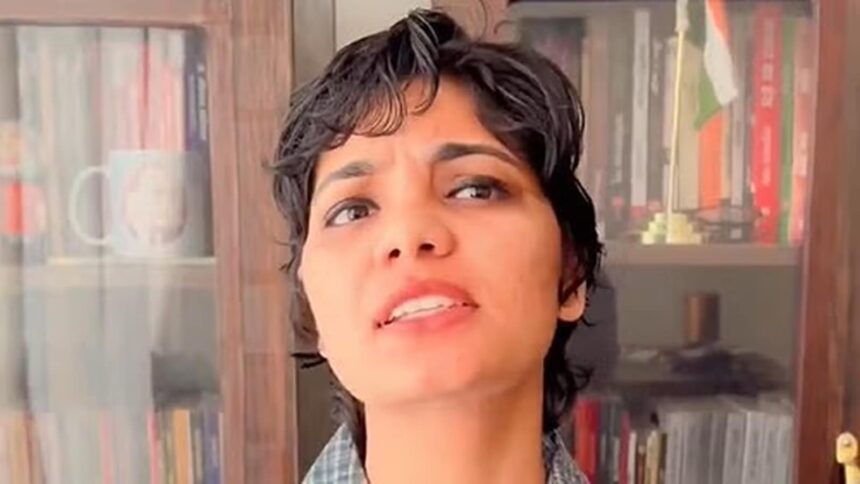Folk singer Neha Singh Rathore, known for her politically charged Bhojpuri ballads, was booked on Sunday for allegedly posting provocative messages on social media that authorities felt could potentially incite “communal tensions” in the aftermath of the Pahalgam terror attack on April 22.
The complaint, filed by a local resident, Abhay Pratap Singh, accused Rathore of sharing posts that “attempted to promote sectarian animosity” and “endangered the nation’s sovereignty, unity, and integrity.” A case was registered against Rathore under multiple sections of the Bharatiya Nyaya Sanhita (BNS) – including Section 152, a provision that was introduced after the repeal of the colonial-era sedition law (Section 124A of the Indian Penal Code) – as well as the Information Technology Act, the Uttar Pradesh Police told PTI.
Her remarks came in wake of the attack in and Kashmir’s Pahalgam, where terrorists allegedly targeted and killed 26 people, mostly tourists, after verifying their religious identities. “In this situation, singer and poetess Neha Singh Rathore, using her Twitter (now X) handle @nehafolksinger, made objectionable posts that can adversely affect national integrity,” the complaint said.
Rathore responded defiantly in a video posted to X, accusing the government of attempting to divert attention from its failures in responding to the tragedy. “If you have the guts, bring back the heads of the terrorists,” she said in response to the FIR.
पहलगाम हमले के जवाब में अब तक सरकार ने क्या किया है? मेरे ऊपर FIR ?
अरे दम है तो जाइये…आतंकवादियों के सिर लेकर आइये!
सरकार मेरे ऊपर FIR करवाकर असली मुद्दों से ध्यान भटकाना चाहती है…क्या ये बात समझना इतना मुश्किल है?
— Neha Singh Rathore (@nehafolksinger)
In another post, she wrote: “… today ’s IT cell is calling me a traitor because I ask questions without fear. Is it treason to ask questions to the Prime Minister?”
पूरी भाजपा के नेताओं के जितने बच्चे फ़ौज में होंगे…उससे ज़्यादा तो मेरे अपने परिवार के लोग सेना में अपनी जान दाँव पर लगा चुके हैं…
…लेकिन आज भाजपा का आईटी सेल मुझे देशद्रोही कह रहा है क्योंकि मैं बिना डरे सवाल पूछती हूँ.
प्रधानमंत्री से सवाल पूछना देशद्रोह है क्या?…
— Neha Singh Rathore (@nehafolksinger)
What is Section 152 of the BNS?
The First Information Report (FIR) was filed at Hazratganj police station under Section 152 of the BNS, a provision that criminalises acts that endanger India’s unity and integrity. The provision, introduced after the repeal of the colonial-era sedition law (Section 124A of the Indian Penal Code), penalises actions or attempts that incite secession, armed rebellion, or subversive activities, or encourage separatist sentiments destabilising the nation.
However, courts have cautioned against misuse of the law. In December 2024, the Rajasthan High Court, in Tejender Pal Singh vs State of Rajasthan, warned that Section 152 must not be wielded as a weapon against legitimate political dissent. Justice Arun Monga, noting the provision’s roots in the old sedition law, said it “revives the essence of sedition under a new guise” and emphasised that it applies only to deliberate acts undertaken with malicious intent.
The Court also pointed out a safeguard within the law’s explanation that lawful criticism of government policies does not fall within its ambit — balancing national security with freedom of expression.
The Court’s warning echoes broader judicial concerns. In 2022, the Supreme Court had suspended all pending trials under Section 124A and advised the government to reconsider the sedition law, a move that led to the verbal announcement of its repeal. Yet, critics , now in force under the BNS, replicates many of the same flaws.
Section 152 criminalises “acts endangering the sovereignty, unity, and integrity of India,” but crucially, it does not define what constitutes such endangerment. This vagueness leaves the provision open to broad interpretation by law enforcement — meaning that a critical speech, a controversial social media post, or even an expression of sympathy toward a contentious figure could become grounds for arrest.
This is not Rathore’s first brush with authorities. Last year, the notice over her viral song UP mein ka ba (“What’s happening in UP?”) that criticised the Uttar Pradesh government over an anti-encroachment drive. Rathore and her husband, Himanshu, recounted how police attempts to serve the notice created unease in their New neighbourhood, with some residents reportedly asking the couple to move out.
Despite mounting pressures, Rathore, in 2024, had insisted she would not be silenced. “Criticism is the soap that keeps democracy clean,” she had said in an interview with . “Enough artists are singing praises of the government for awards. I sing for the common man.”
Back then, the fallout from her activism had deeply affected her family. Her mother, living in rural Bihar, was hospitalised from stress, while Rathore recounted harassment and threats in public spaces. Yet Rathore, who composes, writes, and performs her songs independently, had said: “If they try to muzzle my voice, they are only making me bigger — and themselves smaller,” she had said.








